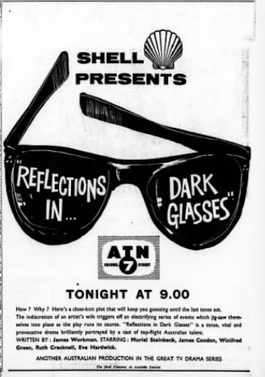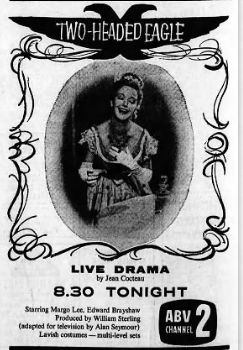Related Research Articles

John Michael Safran is an Australian radio personality, satirist, documentary maker and author, known for combining humour with religious, political and ethnic issues. First gaining fame appearing in Race Around the World in 1997, Safran went on to produce a series of documentaries, television shows and host radio programs.

Blue Murder is an Australian live television play which aired in 1959 on ABC. Broadcast live in Sydney on 2 December 1959, a kinescope ("telerecording") was made of the broadcast so it could be shown in Melbourne.

"Reflections in Dark Glasses" is an Australian television film, or rather a television play, which aired in 1960. It aired as part of Shell Presents, which consisted of monthly presentations of stand-alone television dramas. It was written by Sydney writer James Workman, and is notable as an early example of Australian-written television drama. It was broadcast live in Sydney on 6 February 1960, then recorded and shown in Melbourne.
His Excellency is a 1958 Australian television film.

The Young Victoria is an Australian television film of 1963 which aired on ABC on 27 March 1963. Based on the play Victoria Regina, it is a 60-minute drama about the courtship and marriage of Queen Victoria to Prince Albert. It stars Lola Brooks as Victoria and Ric Hutton as Albert.
"The Sweet Sad Story of Elmo and Me" is a 1965 Australian television film which aired on ABC as part of Wednesday Theatre. It aired on 28 July 1965 in Melbourne and Sydney.
Citizen of Westminster is an early example of Australian television drama which aired on ABC. A one-off play set in England, it aired live on 8 October 1958 in Sydney, and kinescoped for showing in Melbourne on 30 November 1958. Australian TV drama was relatively rare at the time.
Venus Observed is a play in blank verse by the English dramatist and poet Christopher Fry. The play concerns a Duke who decides to remarry for a third time. He gets his son Edgar to pick the bride. The Duke likes Perpetua but Edgar wants her for himself.
The Case of Private Hamp is a 1962 Australian television film which aired on the ABC. Despite the wiping of the era, a copy of the presentation exists as a kinescope recording.
"A Season in Hell" is a 1964 Australian TV movie broadcast on the ABC which originally aired as an episode of Wednesday Theatre. It was directed by Henri Safran from a script by Patricia Hooker and was shot at the ABC's Gore Hill Studios in Sydney. "A Season in Hell" aired on 1 April 1964 in Sydney, on 22 April 1964 in Brisbane, and on 29 April 1964 in Melbourne.

The Life and Death of King Richard II was a 1960 Australian live TV production of the play by William Shakespeare directed by Raymond Menmuir. It aired on 5 October 1960 and was one of the most elaborate productions made for Australian TV at that time.
The Concord of Sweet Sounds is a 1963 Australian television play starring Stuart Wagstaff, directed by Henri Safran and written by Patricia Hooker. Henry Gilbert played a musical genius. Australian TV drama was relatively rare at the time.

Two Headed Eagle is a 1960 Australian television play directed by William Sterling and starring Margo Lee. It was based on a play by Jean Cocteau which had been first presented on the London stage in 1946. The adaptation was by Alan Seymour who wrote a number of TV plays around this time. The play had been produced with Tallulah Bankhead.
George F. Kerr was an English writer best known for his work in TV. He worked for eight years in British TV as a writer and script editor.
Waters of the Moon is a 1951 stage play by N. C. Hunter which originally ran for two years at the Theatre Royal Haymarket from 1951 to 1953. It was adapted into a 1961 TV play broadcast by the Australian Broadcasting Corporation. This version was directed by Christopher Muir. In 1977 it was revived at the Theatre Royal Haymarket with Ingrid Bergman as Helen Lancaster and Wendy Hiller, who had appeared in the original 1951 production, now playing the role of Mrs. Whyte.
Prelude to Harvest is a 1963 Australian television play. It was written by Kay Keavney and directed by Colin Dean.
The Big Client is a 1961 Australian television play. It was directed by James Upshaw. It screened "live" on the ABC on 19 July 1961 and was recorded in Sydney Australian TV drama was relatively rare at the time.
In Writing is a 1961 Australian television play by an Australian writer living in London, Raymond Bowers, and directed by Kevin Shine.

The Emperor Jones is a 1960 Australian TV play based on the play The Emperor Jones by Eugene O'Neill. It starred Joe Jenkins, a dancer who was living in Australia. He played a triple role.
"The Grey Nurse Said Nothing" is a television play episode from the Australian television series The General Motors Hour. It was produced and directed by David Cahill. It was made by Channel Seven who later called "the most ambitious dramatic production ever attempted in Australia... [written by] one of the world's foremost authors of television plays and the cast is Ihe largest ever assembled for an Australian television dramatic production.... the greatest care has been taken to achieve the maximum possible standard in the production of the play which covered a total period of approximately eight weeks." The episode aired on 28 May 1960 in Sydney and Melbourne, and on 11 June 1960 in Brisbane.
References
- ↑ "TV Guide". Sydney Morning Herald. 14 August 1961. p. 18.
- ↑ "TV Guide". The Age. 14 September 1961. p. 33.
- ↑ "Traveller without luggage". TV Times. 6 December 1962. p. 14.
- ↑ "TV guide". Sydney Morning Herald. 16 August 1961. p. 21.
- ↑ "Heiress takes over Ninepins". The Australian Women's Weekly . 30 August 1961. p. 19. Retrieved 23 June 2015– via National Library of Australia.
- ↑ Vagg, Stephen (18 February 2019). "60 Australian TV Plays of the 1950s & '60s". Filmink.
- ↑ "The Past Featured in Plays". Sydney Morning Herald. 2 July 1960. p. 6.
- ↑ "Anouilh's Play on TV". Sydney Morning Herald. 17 August 1961. p. 5.